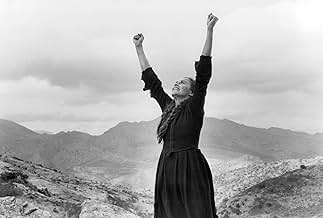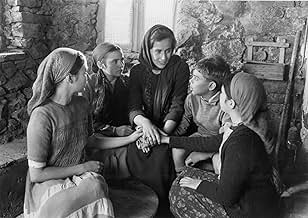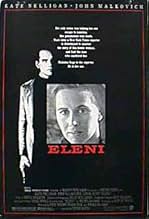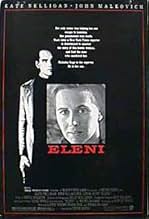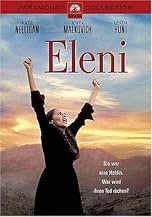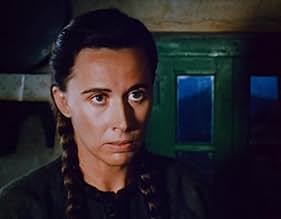IMDb RATING
6.9/10
1.7K
YOUR RATING
A mother's love for her children leads to a son's revenge for her death in this dramatic thriller that begins during the Greek civil war.A mother's love for her children leads to a son's revenge for her death in this dramatic thriller that begins during the Greek civil war.A mother's love for her children leads to a son's revenge for her death in this dramatic thriller that begins during the Greek civil war.
- Director
- Writers
- All cast & crew
- Production, box office & more at IMDbPro
Featured reviews
I weep because my family is portrayed in this film. It reminds me of the pain they went through but refused to speak about. A story that received no fanfare but brought pain to many. I see through the eyes of the director and the words of Nick Gage what they went through. A beautiful, love letter to a strong mother.
As another reviewer wrote, this is a movie about a family, not about politics - even though it is terror that causes that family to be harmed.
As the mother, Kate Nelligan is absolutely superb, shining, wonderful. As the son as an adult, John Malkovich is curiously detached.
Again, although the movie was first rate, I question the decision to alternate time periods with a parallel narratives throughout. I think it lessens the impact. I see no reason the story couldn't be told chronologically, to greater effect.
Those two reviewers from Argentina and Greece who wrote that the movie was propaganda are being silly. Neither this movie nor anyone denies that the Communists (and those democrats defending the former king and government who had returned to power after the war - the king wishing to reign but not rule) fought the Nazis during the Second World War.
This movie does not take place during that war - and doesn't refer to it.
Further, when the Second World War ended, there WERE no native Greek fascists fighting in the Civil War - when a reviewer writes that this was a fascist war, it's crazy. In the movie, you hear the Communists using the term, "fascist" in the same loose propagandistic way that, say, Prime Minister Tony Blair is referred to as a fascist - falsely.
As the Soviet Union's proxies looked to be gaining in the Civil War, Britain asked the United States to participate in an effort to aid the Greek government with financial aid and weapons. over this and the Communist insurgency in turkey, was the Truman doctrine of containment of Communist totalitarianism born. These are simply facts.
Moreover, the fact that the Greek Communists took tens of thousands of children from their parents and shipped them off to Communists countries such as Albania and Czechoslovakia is obviously well-documented in the book and movie. However, as I wrote above, the movie simply looks at a human story of a mother and her love for her children.
Kate Nelligan makes the movie heartfelt, moving, powerful. She should have won the Oscar for this performance.
As the mother, Kate Nelligan is absolutely superb, shining, wonderful. As the son as an adult, John Malkovich is curiously detached.
Again, although the movie was first rate, I question the decision to alternate time periods with a parallel narratives throughout. I think it lessens the impact. I see no reason the story couldn't be told chronologically, to greater effect.
Those two reviewers from Argentina and Greece who wrote that the movie was propaganda are being silly. Neither this movie nor anyone denies that the Communists (and those democrats defending the former king and government who had returned to power after the war - the king wishing to reign but not rule) fought the Nazis during the Second World War.
This movie does not take place during that war - and doesn't refer to it.
Further, when the Second World War ended, there WERE no native Greek fascists fighting in the Civil War - when a reviewer writes that this was a fascist war, it's crazy. In the movie, you hear the Communists using the term, "fascist" in the same loose propagandistic way that, say, Prime Minister Tony Blair is referred to as a fascist - falsely.
As the Soviet Union's proxies looked to be gaining in the Civil War, Britain asked the United States to participate in an effort to aid the Greek government with financial aid and weapons. over this and the Communist insurgency in turkey, was the Truman doctrine of containment of Communist totalitarianism born. These are simply facts.
Moreover, the fact that the Greek Communists took tens of thousands of children from their parents and shipped them off to Communists countries such as Albania and Czechoslovakia is obviously well-documented in the book and movie. However, as I wrote above, the movie simply looks at a human story of a mother and her love for her children.
Kate Nelligan makes the movie heartfelt, moving, powerful. She should have won the Oscar for this performance.
This is not a comment to the movie itself. The bits I have seen show at least an accurate portrayal of rural Greece in the late 40's along with the political "turmoil" of the time. Acting was above average in general, although some members of the cast, notably Malkovich, could have done a slightly better job.
So, is this propaganda? Of course it is BUT with more grains of truth than your average propaganda film, especially an American made. Yes, Mr Gatzoyannis (unless he is ashamed to use his real family name and resorts to "Gage") had lost his mother during the civil war. He is supposed to be one-sided, who wouldn't? He wrote a book about it, good for him. Someone made a film based on it, good for them. And now, many of us are bickering about what it is, propaganda or not, who are the good and who are the bad ones and so on...
A commentator before said that war is the end of civilization. True! A civil war though makes an "ordinary" war look quite civilized and "noble". Americans surely have their experience, they have gone through a terrible civil war. We, Greeks, have our experience which, sadly, is more "fresh" - lots of people that lived through it are still around to talk about it. Kids being taken from their mothers' arms to be transported..where? Brother killing brother (literally!) and generally bringing down whatever was once dear. Who's the bad guy? Which brother gets moral high ground? The one who took to mountains, kidnapped young ones to put them through a grim life behind the Iron Curtain, laid waste to his land and his home? Or the other, who after suffering all that, imprisoned those left behind (the majority of which were not part of the armed struggle and suffered along too), exiled them to desolate barren islands (there are more than we need of those in the Aegean), made them "dance" with cats in a sack (interesting how democracy, or "democracy", can be as horrendous as communism or any other totalitarian regime) and generally held them at the "border" of society until 1974. Who gets praise and who gets blame? You don't know? I think you do!
History was always written by victors, this is no exception. What is an exception in this case is that this particular "victor" (Gage) abstained his country's drama until it "suited" him to be a part of it. Having lost a loved one, a parent, in war is no unique to him, millions of people did! Did he live the ongoing "plague" that the civil war was? From the comfort of his house, half a world away. It is almost as if I, who have never been to the US, write a book about the drama of the Indians. Whatever moral high ground he possessed he lessened being that "distanced" from the whole scenery of it and its consequences. In short, this book and film portray HIS side, not his ideology's side but his personal side. It is easy to place blame, very hard to do so for one side only!
I will not go into the politics of that period, that is for another place and another time. Decent film, worth a viewing if not for anything else for an accurate portrayal of the "scenery". No stars awarded as I have not seen it all, just bits and pieces.
So, is this propaganda? Of course it is BUT with more grains of truth than your average propaganda film, especially an American made. Yes, Mr Gatzoyannis (unless he is ashamed to use his real family name and resorts to "Gage") had lost his mother during the civil war. He is supposed to be one-sided, who wouldn't? He wrote a book about it, good for him. Someone made a film based on it, good for them. And now, many of us are bickering about what it is, propaganda or not, who are the good and who are the bad ones and so on...
A commentator before said that war is the end of civilization. True! A civil war though makes an "ordinary" war look quite civilized and "noble". Americans surely have their experience, they have gone through a terrible civil war. We, Greeks, have our experience which, sadly, is more "fresh" - lots of people that lived through it are still around to talk about it. Kids being taken from their mothers' arms to be transported..where? Brother killing brother (literally!) and generally bringing down whatever was once dear. Who's the bad guy? Which brother gets moral high ground? The one who took to mountains, kidnapped young ones to put them through a grim life behind the Iron Curtain, laid waste to his land and his home? Or the other, who after suffering all that, imprisoned those left behind (the majority of which were not part of the armed struggle and suffered along too), exiled them to desolate barren islands (there are more than we need of those in the Aegean), made them "dance" with cats in a sack (interesting how democracy, or "democracy", can be as horrendous as communism or any other totalitarian regime) and generally held them at the "border" of society until 1974. Who gets praise and who gets blame? You don't know? I think you do!
History was always written by victors, this is no exception. What is an exception in this case is that this particular "victor" (Gage) abstained his country's drama until it "suited" him to be a part of it. Having lost a loved one, a parent, in war is no unique to him, millions of people did! Did he live the ongoing "plague" that the civil war was? From the comfort of his house, half a world away. It is almost as if I, who have never been to the US, write a book about the drama of the Indians. Whatever moral high ground he possessed he lessened being that "distanced" from the whole scenery of it and its consequences. In short, this book and film portray HIS side, not his ideology's side but his personal side. It is easy to place blame, very hard to do so for one side only!
I will not go into the politics of that period, that is for another place and another time. Decent film, worth a viewing if not for anything else for an accurate portrayal of the "scenery". No stars awarded as I have not seen it all, just bits and pieces.
Other people commenting on this film complain about its being mere propaganda against communism and supporting fascism. What a lot of baloney. It's about mothers and children, and about how, no matter what kind of brawl is going on, the men run to the hills, leaving the women and children behind to be brutalized. And it's about how one woman lost her life because she refused to give her children up to the state, no matter who that state was.
Stunning performances by Kate Nelligan and most of the cast in this powerful story, based on truth, help make this a must-see film.
I wonder if some of the reviewers, such as onceuponatime500, really saw the movie, or if they just wrote from some vicious and preconceived bias.
The communists come to the village to conscript -- kidnap -- children to become guerrilla fighters. The mother, Eleni, takes a drastic step, mutilating her oldest child to spare her from being shanghaied into the communist forces.
Being communists, they will not be thwarted, not by any such reactionary notions as self-ownership, or freedom, or parental rights, or any of that silly stuff: They take the next oldest girl instead.
Eleni loves her children and believes, foolishly according to onceuponatime500, but in line with what Charlie Anderson (James Stewart) in "Shenandoah" said: They're my children, not the state's, not some murderous movement's.
For years after seeing this powerful and haunting story, I could recall Nelligan's last scene and be moved to tears.
The agony Eleni went through was duplicated millions of times in the bloody 20th Century, as some government or another, or some tyrannical movement or another, kidnapped young people to force them to risk their lives for some cause most of them didn't understand, much less support.
Think Viet Cong, think Hitler's armies, think Stalin's and Mao's imperialist and aggressive armies, and, yes, think of the poor draftees from the United States.
Think, contrastingly, of parents, parents who spent years loving and caring for their children, hoping those children would be able to live to a better adulthood than their parents. Think of those parents seeing their children sometimes literally torn from their grasp, thrown into lines to be cannon fodder for cruel warlords -- communists, Nazis, imperialists of one kind or another, even when disguised as crusaders.
"Eleni" works at almost every level except for the incredibly horrible performance by John Malkovich.
If it hadn't been seen as anti-communist, even Hollywood would have honored "Eleni." But its being anti-communist made "Eleni" an outcast in that artistically and morally corrupted town. However, "Eleni" is powerful drama.
Added 25 November 2017: Watching "Eleni" on YouTube, I am wondering if my dislike of John Malkovich's performance is at least as much for how unpleasant he makes Nick Gage. As portrayed by Malkovich, Gage is rude, cold, aloof; he has no personality, doesn't respond to people, not even to his wife who asks questions. As performed by Malkovich, Gage's personality is enough to chase away a viewer.
We are now exactly 100 years after the Bolshevik revolution in Russia, an event that led to hundreds of millions of deaths, and destruction of entire nations, of entire peoples.
There is an irony in Nick Gage's working for The New York Times, which has been frequently pro-communist, and nearly always anti-anti- communist, with its Moscow correspondent Walter Duranty infamously painting a rosy picture of the Soviet Union during the time of the murderous monster Josef Stalin.
This century anniversary makes "Eleni" even more poignant and even more important.
I wonder if some of the reviewers, such as onceuponatime500, really saw the movie, or if they just wrote from some vicious and preconceived bias.
The communists come to the village to conscript -- kidnap -- children to become guerrilla fighters. The mother, Eleni, takes a drastic step, mutilating her oldest child to spare her from being shanghaied into the communist forces.
Being communists, they will not be thwarted, not by any such reactionary notions as self-ownership, or freedom, or parental rights, or any of that silly stuff: They take the next oldest girl instead.
Eleni loves her children and believes, foolishly according to onceuponatime500, but in line with what Charlie Anderson (James Stewart) in "Shenandoah" said: They're my children, not the state's, not some murderous movement's.
For years after seeing this powerful and haunting story, I could recall Nelligan's last scene and be moved to tears.
The agony Eleni went through was duplicated millions of times in the bloody 20th Century, as some government or another, or some tyrannical movement or another, kidnapped young people to force them to risk their lives for some cause most of them didn't understand, much less support.
Think Viet Cong, think Hitler's armies, think Stalin's and Mao's imperialist and aggressive armies, and, yes, think of the poor draftees from the United States.
Think, contrastingly, of parents, parents who spent years loving and caring for their children, hoping those children would be able to live to a better adulthood than their parents. Think of those parents seeing their children sometimes literally torn from their grasp, thrown into lines to be cannon fodder for cruel warlords -- communists, Nazis, imperialists of one kind or another, even when disguised as crusaders.
"Eleni" works at almost every level except for the incredibly horrible performance by John Malkovich.
If it hadn't been seen as anti-communist, even Hollywood would have honored "Eleni." But its being anti-communist made "Eleni" an outcast in that artistically and morally corrupted town. However, "Eleni" is powerful drama.
Added 25 November 2017: Watching "Eleni" on YouTube, I am wondering if my dislike of John Malkovich's performance is at least as much for how unpleasant he makes Nick Gage. As portrayed by Malkovich, Gage is rude, cold, aloof; he has no personality, doesn't respond to people, not even to his wife who asks questions. As performed by Malkovich, Gage's personality is enough to chase away a viewer.
We are now exactly 100 years after the Bolshevik revolution in Russia, an event that led to hundreds of millions of deaths, and destruction of entire nations, of entire peoples.
There is an irony in Nick Gage's working for The New York Times, which has been frequently pro-communist, and nearly always anti-anti- communist, with its Moscow correspondent Walter Duranty infamously painting a rosy picture of the Soviet Union during the time of the murderous monster Josef Stalin.
This century anniversary makes "Eleni" even more poignant and even more important.
Did you know
- TriviaAdditional flashback scenes were filmed featuring Alfred Molina as Nick's father Christos (played by Steve Plytas in the 1980s scenes). Although Molina was credited as "Young Christos" in press materials, and his scenes were shown in publicity photos, his role was almost completely cut from the final version, and his name does not appear in the credits. Molina's only remaining footage in the released film is a single shot of Christos taking a photograph of Eleni, Nikola and family, with his face partially obscured by his camera.
- How long is Eleni?Powered by Alexa
Details
Box office
- Budget
- $12,000,000 (estimated)
- Gross US & Canada
- $305,102
- Opening weekend US & Canada
- $27,875
- Nov 3, 1985
- Gross worldwide
- $305,102
- Runtime1 hour 54 minutes
- Color
- Sound mix
- Aspect ratio
- 1.85 : 1
Contribute to this page
Suggest an edit or add missing content


